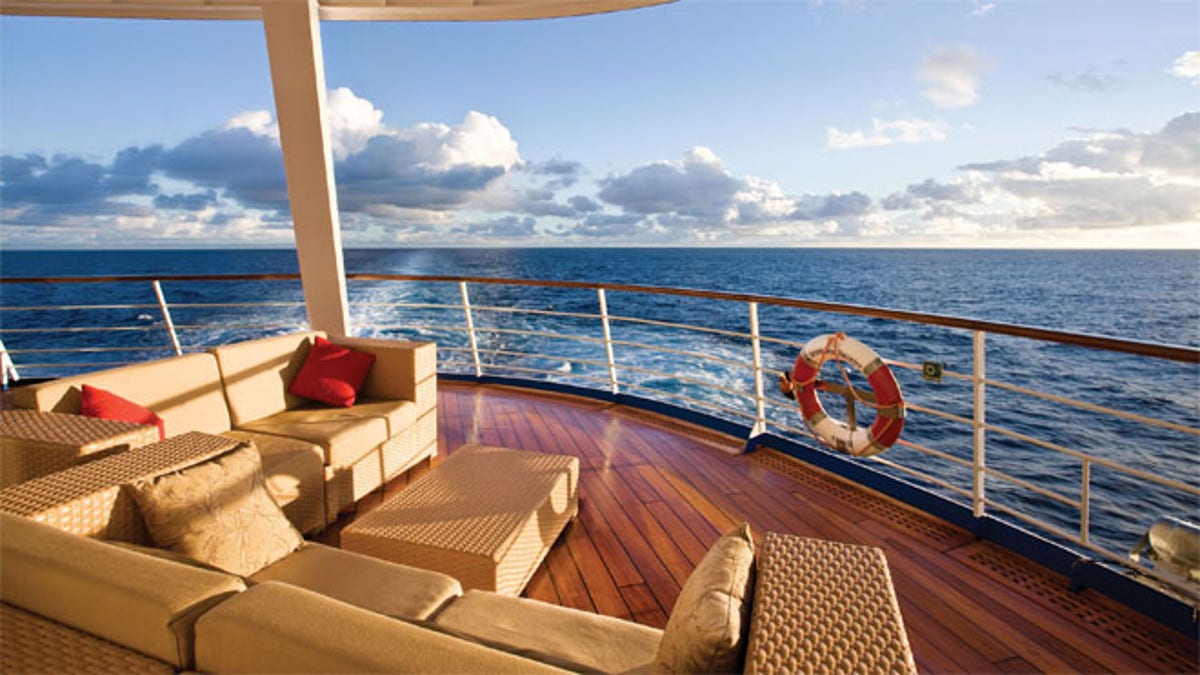
One huge benefit to Regent Seven Seas is the all-inclusive value that go beyond the food and drink. (Regent Seven Seas)
Mainstream cruise ships offer far more diversity and activity at a lower price than the small and quiet ships of luxury cruise lines like Seabourn, Silversea, Crystal and Regent Seven Seas. But many of the well-heeled devotees of these luxury cruise lines have told me, "I wouldn’t be caught dead on those beasts."
After 20 years in business, Regent Seven Seas Cruises recently made changes to its inclusive pricing structure, making it the most expensive cruise line in marketplace. But the surprising result has Regent enjoying its most successful business year yet. One huge benefit to Regent is the all-inclusive value which includes food, drink and shore tours.
I had a chance to speak with the president of Regent Seven Seas, Mark Conroy, to see if I could get a better picture of the mindset behind luxury cruisers.
Paul Motter: Mark, you have been with Regent for all of its 20 years, how did it start?
Mark Conroy: The company, called Radisson Cruises, was started by Carlson Worldwide, founders of Radisson Hotels. We took delivery of our first ship, Radisson Diamond, on my first day. We christened her in Greenwich on the Thames River. She had a revolutionary catamaran-style twin hull. A few years later we took over the 180-passenger Song of Flower and we became “Radisson Seven Seas Cruises.” In 1996 Carlson took 100 percent control of the company. We built the Paul Gauguin in 1997, took delivery of Seven Seas Navigator in 1999, introduced Mariner in 2001 as the first all-suite, all-balcony cruise ship, and Voyager came in 2003.
Motter: Both the Radisson Diamond and the Song of Flower were iconic and very popular ships.
Conroy: Yes, but as they aged it was hard to keep them up to code, so we soon reduced our fleet the three newer ships.
Motter: Then is 2006 Carlson changed the name from Radisson to Regent Seven Seas.
Conroy: Yes, that was just a technicality. The biggest change came in 2008 when Carlson sold the all of Regent to Apollo Management, who had also just acquired Oceania Cruises and half of Norwegian Cruise Lines.
Motter: Did that change things for you?
Conroy: Not really. Apollo is an investment group, not a cruise company, but they created an umbrella company to manage both Regent and Oceania they named Prestige Cruise Holdings and they selected Frank Del Rio, the founder of Oceania Cruises, as the chairman.
Motter: I am hearing Regent’s 20th is your best year in business yet, despite the economy. What’s your secret?
Conroy: The secret is to identify and provide what our customers want. In addition to excellent food, gratuities and all beverages we now also include shore tours in every port of call in our cruise fare. That’s any tour we would have priced at up to $220, and for more expensive tours we deduct $220 from the bottom line.
Motter: So, the cruiser has almost everything included, but obviously this inclusiveness comes at a higher price? I find it interesting that luxury cruisers prefer to essentially pre-pay for things they may not use. People tell me they like having drinks included even if they don’t drink alcohol. That is not a typical “value approach” to consumerism.
Conroy: That is one of expected things, convenience is far more important to our guests than the bottom-line cost of the cruise. We also include pre-cruise hotel nights and airfare supplements with every cruise. But if a customer doesn’t want those we will adjust the cost.
Motter: So the same principle of convenience applies? Is it really that simple?
Conroy: Actually, if you do the math and compare one of our suites to a similar suite on a line like Celebrity, when you add up the cost of all the extras you find the final cost is very similar.
Motter: Actually, I have done that exact math. I took a 300 square foot suite on both Regent and Celebrity and if you have three or four drinks per day, take a tour in every port and pay gratuities it is roughly the same price.
Conroy: Thank you.
Motter: But the difference is that not everyone will want all the extras on every day of the cruise, when everything is pre-paid a customer loses the opportunity to save money.
Conroy: Ah, but our guests see it differently – they see an opportunity to have things they might have otherwise missed. A guest revisiting any given port might be thinking she has already seen it all, but then she tries a tour that was totally off her radar just because it is there, and she discovers something amazing. That’s the kind of experience that can make a cruise truly memorable.
Motter: How do you see your competition? I see many similarities but also some distinct differences in the luxury cruise lines - from the very small (200-passenger) ships of Seabourn to the 1000 plus ships of Crystal. Some are in port every day; others spend the majority of time at sea. Some offer butlers with every stateroom, others have no butlers at all
Conroy: I think Crystal was very smart to go all-inclusive, and their bookings reflect that. As for the rest, I want all of my competition to do well. First of all, it boosts the image of the luxury cruise sector, and second, I don’t want anyone dropping their prices on me.
Motter: After seeing the success of Oceania, are you thinking of building a new cruise ship soon?
Conroy: Well, we don’t comment on those plans until they are official.
Motter: Frank Del Rio recently told us that if (parent company) Prestige wants to build a new ship it will most likely be for Regent.
Conroy: Well, that’s Frank, and one of the benefits of being the chairman.








































